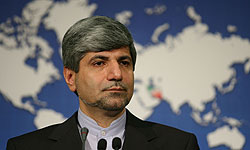Iran’s Foreign Ministry Spokesman Ramin Mehman-Parast lambasted the US police and security forces for the Wednesday attack on him and other members of the Iranian delegation to the UN  General Assembly meeting, saying that the hosting country must be accountable for the security of foreign diplomats.
General Assembly meeting, saying that the hosting country must be accountable for the security of foreign diplomats.
"Unfortunately we witnessed a form of US police’s indifference to the actions of the terrorist members of the Mojahedin-e Khalq Organization (MKO) and no matter how many times we gestured to the police that they need to stop the attacks of these individuals, they remained apathetic," Mehman-Parast told reporters on the sidelines of the 67th session of the United Nations General Assembly in New York.
Mehman-Parast added that the police only intervened when the attack intensified and later released a statement that the incident had taken place.
The Iranian diplomat pointed out that the host country is responsible for the safety of diplomats and permitting such an incident to occur is not befitting the US as a host.
"It is unfortunate to witness such behavior towards our country and to see the West permitting this terrorist cell continue its activities," Mehman-Parast added.
Mehman-Parast and several other Iranian officials were walking to their hotel when they were surrounded and assaulted by MKO terrorists on Wednesday.
New York City police and the US security forces made no arrests as the attackers physically abused members of the Iranian delegation accompanying Iran’s President Mahmoud Ahmadinejad in his visit to the United States to address the 67th session of the UN General Assembly.
The incident came days after US Secretary of State Hillary Clinton notified Congress that she plans to take MKO (also known as the MEK, PMOI and NCR) off a State Department terror list.
The MKO is blacklisted by much of the international community.
Before an overture by the EU, the MKO was on the European Union’s list of terrorist organizations subject to an EU-wide assets freeze. Yet, the MKO puppet leader, Maryam Rajavi, who has residency in France, regularly visited Brussels and despite the ban enjoyed full freedom in Europe.
The MKO is behind a slew of assassinations and bombings inside Iran, a number of EU parliamentarians said in a recent letter in which they slammed a British court decision to remove the MKO from the British terror list. The EU officials also added that the group has no public support within Iran because of their role in helping Saddam Hussein in the Iraqi imposed war on Iran (1980-1988).
Many of the MKO members abandoned the terrorist organization while most of those still remaining in the camp are said to be willing to quit but are under pressure and torture not to do so.
The group, founded in the 1960s, blended elements of Islamism and Stalinism and participated in the overthrow of the US-backed Shah of Iran in 1979. Ahead of the revolution, the MKO conducted attacks and assassinations against both Iranian and Western targets.
The group started assassination of the citizens and officials after the revolution in a bid to take control of the newly established Islamic Republic. It killed several of Iran’s new leaders in the early years after the revolution, including the then President, Mohammad Ali Rajayee, Prime Minister, Mohammad Javad Bahonar and the Judiciary Chief, Mohammad Hossein Beheshti who were killed in bomb attacks by MKO members in 1981.
The group fled to Iraq in 1986, where it was protected by Saddam Hussein and where it helped the Iraqi dictator suppress Shiite and Kurd uprisings in the country.
The terrorist group joined Saddam’s army during the Iraqi imposed war on Iran (1980-1988) and helped Saddam and killed thousands of Iranian civilians and soldiers during the US-backed Iraqi imposed war on Iran.

